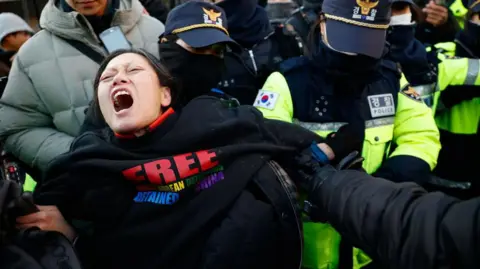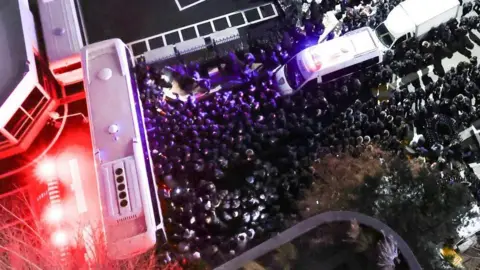Why was it so difficult to arrest the ousted president?

 Getty Images
Getty ImagesJust before dawn on Wednesday, 3,000 police officers arrived at the residence of suspended South Korean President Yoon Suk Yeol.
Their mission: to catch him.
Investigators used ladders to jump over buses and bolt cutters to cut through barbed wire as they broke through multiple barriers designed to stop them. Others rode nearby roads to get to the president’s residence.
Hours later, they arrested him.
This was their second attempt. The first of these, which took place earlier this month, saw about 150 policemen face a six-hour standoff with the president’s security detail.
They couldn’t help themselves, they started with a large number of Yoon’s fans who had gathered outside his house to stop the police, then with a wall of security people inside the place.
In the end, the investigators concluded that it was “impossible” to catch him – and they left.
By many accounts, Yoon is now a disgraced leader – impeached and suspended from his position as president, while he. pending the decision of the constitutional courtwhich can remove him from office.
So why was it so hard to catch him?
Men guard the president
It’s been an unprecedented few days in South Korea since Yoon issued a shock and temporary military order on December 3.
The lawyers voted to put him in office, and then came the criminal investigation and his refusal to be investigated, which is what led to his arrest.
Another roadblock of police arrested Yoon’s presidential security team, who on January 3 formed a wall of people and used vehicles to block the police’s path.
Analysts said they could be loyal to Yoon, pointing out that Yoon himself has appointed several leaders of the Presidential Security Service (PSS).
“It is possible that Yoon has infiltrated the organization with strong loyalists to prepare for this incident,” said US-based lawyer and Korea expert Christopher Jumin Lee.
It is not clear why they were reported to have resisted this, although Mr Lee believes the team may have been stopped by “police violence”.
“At the end of the day I think they were not willing to engage in the kind of mass violence against law enforcement that Yoon’s defense would have wanted,” he said.
At the beginning of the week, the CIO warned the PSS that they risk losing their pensions and their status as civil servants due to the prevention of arrests.
On the contrary, it assured those who “defy illegal orders” to prevent arrests that they “will not face any harm”.
On Wednesday, Yonhap media reported that several PSS members were on leave or chose to stay indoors.
Apart from his security, the right-wing leader also has a strong base of support. Some of his supporters once told the BBC that they were he is prepared to die to protect her and repeat baseless allegations that Yoon himself is still afloat, including that the country has been infiltrated by pro-North Korean forces.
On January 3, thousands of them, undaunted by the cold, camped outside his house to prevent the arresting party from entering. They cried for joy when they found out that the group was quitting.
It was a similar story on Wednesday, when a crowd of Yoon’s supporters showed up and some clashed with the police to stop the arrest.
When they heard that Yoon was arrested, some of them cried.
An ‘incapacitated’ agency
But the organization that has come to the fore is the Corruption Investigation Office for High-Rank Officials (CIO), which is leading the investigation in collaboration with the police,
There have been questions raised about how it failed to arrest Yoon on its first try, with critics accusing it of being unprepared and lacking in coordination.
The center was established four years ago by the previous administration, in response to public anger over former president Park Geun-hye who was ousted, impeached and imprisoned for corruption.
This month’s failed attempt was a “continuing black eye” for the CIO, which already “does not have a good reputation, for political and technical reasons”, said Mason Richey, associate professor at Seoul’s Hankuk University of Foreign Studies.
 Reuters
ReutersThe CIO may book today’s successful arrest as a win, but it remains to be seen how they will handle the investigation going forward, Assoc Prof Richey said.
“A lot of people don’t trust their messages about the investigation,” he adds.
“We got into this mess after various organizations stepped in to lead the investigation for their own benefit,” said lawyer Lee Chang-min, a member of the Lawyers for a Democratic Society.
“Even if a joint panel of investigators is retained, the case should be transferred to the police, who must show their authority,” he added.
The CIO does not actually have the power to file charges against Yoon, and is expected to refer the case to federal prosecutors after its investigation.
Yoon’s lawyers also argued that the CIO, as an anti-corruption agency, has no power to investigate allegations of treason against Yoon.
South Korea is now in uncharted territory, and Yoon is the first president to be arrested.
And the investigation into him has “brought together people on the far right, a lot of people” in the Conservative coalition, which could have “a big impact” on the country’s ongoing politics, Mr Lee said.
Additional report by Koh Ewe
Source link




